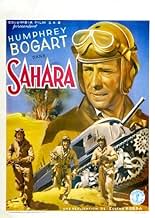After the fall of Tobruk in 1942, during the Allied retreat in the Libyan desert, an American tank picks-up a motley group of survivors but they face advancing Germans and a lack of water.After the fall of Tobruk in 1942, during the Allied retreat in the Libyan desert, an American tank picks-up a motley group of survivors but they face advancing Germans and a lack of water.After the fall of Tobruk in 1942, during the Allied retreat in the Libyan desert, an American tank picks-up a motley group of survivors but they face advancing Germans and a lack of water.
- Nominated for 3 Oscars
- 3 nominations total
- Capt. Jason Halliday
- (as Richard Nugent)
- Jean Leroux - 'Frenchie'
- (as Louis T. Mercier)
- Capt. von Schletow
- (as Kurt Krueger)
- Soldier
- (uncredited)
- German Private
- (uncredited)
- Soldier
- (uncredited)
- German Private
- (uncredited)
- British Soldier
- (uncredited)
Storyline
Did you know
- TriviaKurt Kreuger said that in the scene where he tried to escape back to his lines with the Sudanese sergeant (Rex Ingram) in pursuit, Ingram caught him and pressed his face into the sand to kill him, Kreuger almost passed out due to lack of air.
- GoofsAll of the German vehicles are emblazoned with Nazi Party swastikas rather than the Balkenkreuz, the straight-armed cross that was the emblem of the Wehrmacht used on their vehicles during WWII.
- Quotes
Giuseppe: Mussolini is not so clever like Hitler, he can dress his Italians up only to look like thieves, cheats, murderers, he cannot like Hitler, make them feel like that. He cannot, like Hitler, scrape from the conscience the knowledge that right is right and wrong is wrong, or dig holes in their heads to plant his own ten commandments: steal from thy neighbor, cheat thy neighbor, kill thy neighbor.
Capt. von Schletow: You dare to insult the Führer?
Giuseppe: That would take an artiste - I am but a mechanic.
- Crazy creditsOpening credits prologue: In June, 1942, a small detachment of American tanks with American crews, joined the British Eighth Army in North Africa to get experience in desert warfare under actual battle conditions.
History has proved that they learned their lesson well - -
- ConnectionsFeatured in Going Hollywood: The War Years (1988)
"Sahara," the story of a rag-tag group of soldiers fleeing from Rommel's Afrika Korps in a US tank, is enjoyable throughout. The cast is fine, representing a number of nationalities and even races. I think this is one of Bogart's better acting jobs, and J. Carrol Naish, Lloyd Bridges, Rex Ingram, Dan Duryea, and the others are equally good.
While this may be a propaganda film, it is no "our hero wipes out an enemy division without a scratch" potboiler. On the contrary, the decision made by Sgt. Joe Gunn (Bogart) to stay and fight a German regiment rather than heading for British lines is a desperate gamble little better than a suicide mission. This brings up my second point; the ethical question.
St. Gunn gets the idea to stay at the oasis they have reached in order to fight and delay a German regiment in hopes that such a sacrifice may help the Allied cause. He must convince the others, and one or two do not go along without some persuading. "I don't mind fighting and dying," one says, "but this is pointless." Well, that's the issue. How easy it is to find reasons NOT to stay behind and fight! Makes me appreciate the plight of our soldiers on Bataan and Wake Island, who had no choice. But this little band does stay and fight, and the story hangs on their decision.
My third point is a bit arcane, and has to do with Hollywood business practices of the 1940s. Bogart was, when this movie started production, about the biggest star in Hollywood. Remember, he had already made High Sierra," "The Maltese Falcon," and "Casablanca." Why then, did Warner Brothers lend him out to Columbia to do this picture? Columbia was still barely a second rank studio. What did they have to trade in return? Rita Hayworth? I don't think she made any films for Warners, but I may be wrong.
Lastly, it's interesting to note that Bogart, when he started his own company (Santana Productions) in the late 40s, signed a releasing deal with Columbia. I guess he must have been impressed with Columbia while making this picture, as well as "Dead Reckoning" (1947).
I strongly recommend "Sahara" to anyone who has not seen it. It's exciting action combined with interesting characterizations.
- How long is Sahara?Powered by Alexa
Details
Box office
- Gross US & Canada
- $2,300,000
- Runtime1 hour 37 minutes
- Color
- Aspect ratio
- 1.37 : 1
Contribute to this page



































